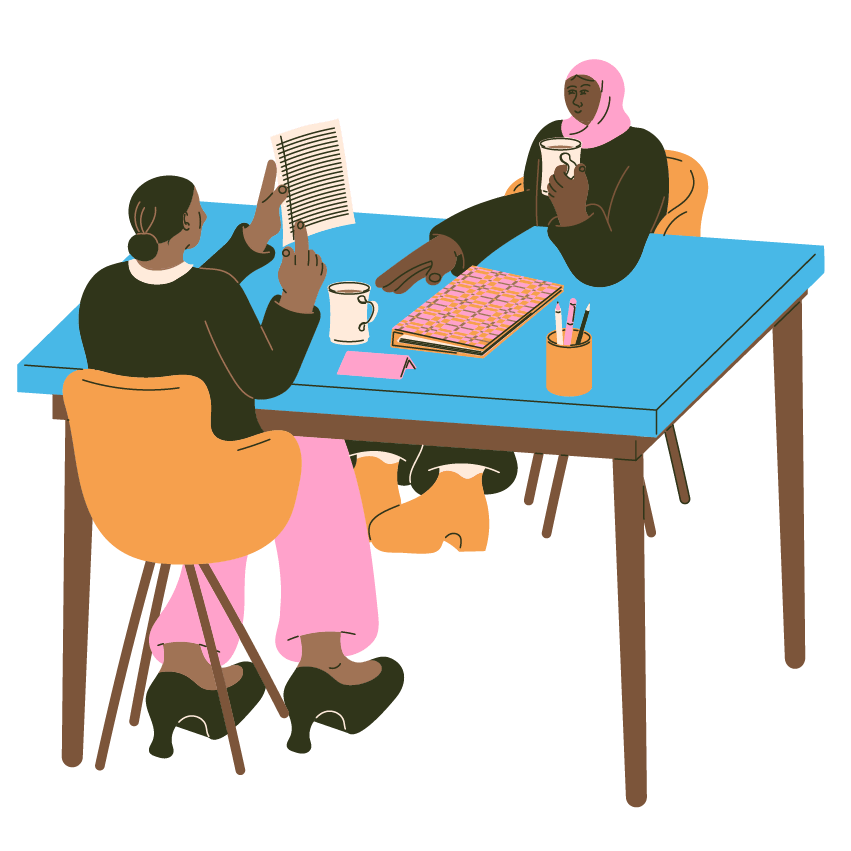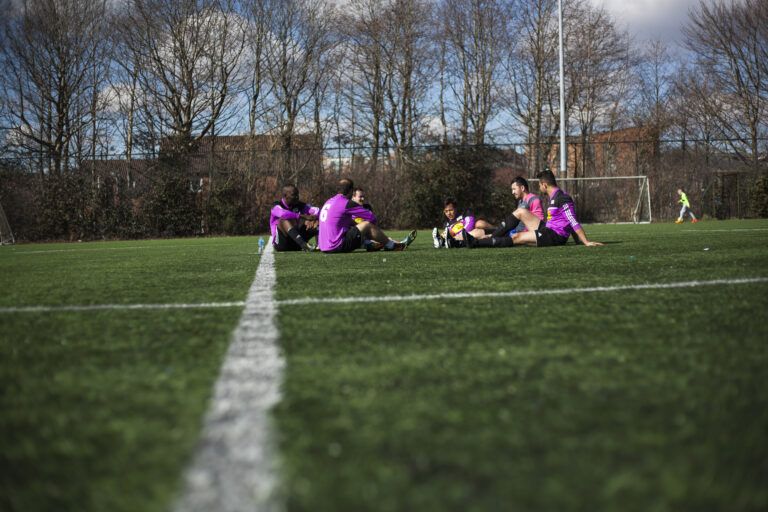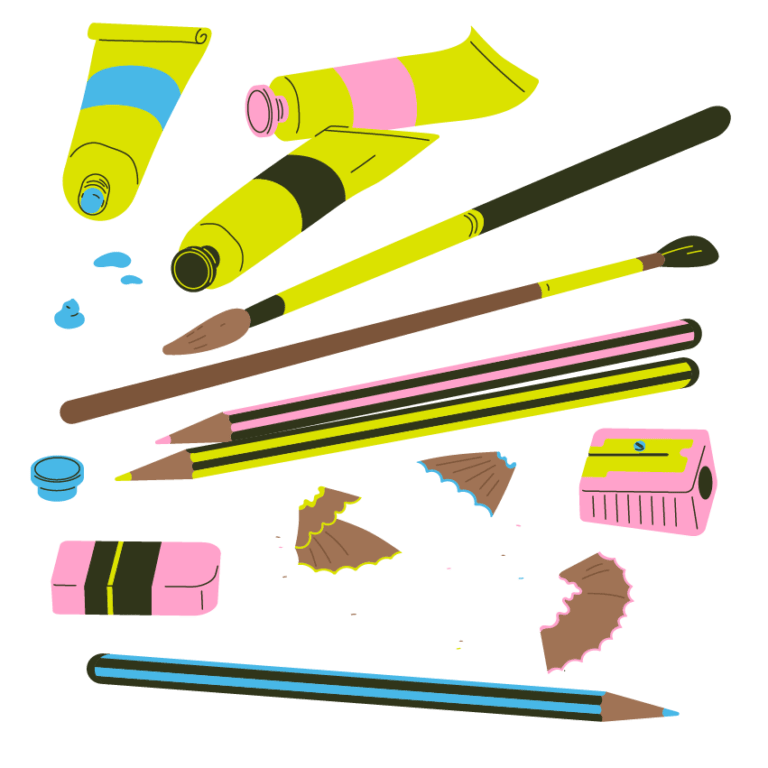“Our Rights, Our Communities” is a partnership project involving GBCT and Refugee-led Community Organisations Unity Sisters and Milk Cafe. The Project developed and expanded on the work carried out for a number of years pre pandemic as well as drawing on the learning and delivery which happened during the pandemic.
Our Rights, Our Communities


The Project will deliver a unique model of community-based advocacy, replicable within Scottish refugee communities, that explores, acknowledges and develops an understanding of intersectional oppression and creates collective and accessible resources to tackle this from a grassroots perspective.
The Partnership aims at delivering the following:
- Furthering equality and human rights of Refugee Women, following the principles of redistribution of power
- Developing knowledge and skills for organisational development and capacity
- 3. Alliance building between organisations working with Refugee Women
Key Information
Project Partner
GBCT, Milk and Unity Sisters
Geographical reach
Glasgow
Dates
01/10/2021 – 30/11/2022
Target Groups
Women, Refugees, Asylum Seekers, Families
Project Type
Supporting innovation
Background
Racism and discrimination have increased across Scottish society as a result of anti-immigration policies and Brexit, and the pandemic has exacerbated this further. The lived experience of Refugee Women groups highlights the very limited opportunities they have to deliver qualified and appropriate human rights advocacy, due to lack of resources and skills. The Partners believe that capacity building is key to effective change towards Refugee Women’s equality and human rights.
Feedback from Partners shows that larger organisations tasked with delivering support have strategic frameworks that Refugee Women feel they need to fit into. In addition, these programmes often do not have resources to provide tailored and meaningful peer-support which is flexible and responsive to the needs of these groups. The Partnership believes that in order for Refugee Women to contribute to shaping planned delivery, they require tailored skills and resources they have confidence in.
Involvement of New Scots in project
The staff and volunteers on the delivery side, as well as the participants, are all refugees, asylum seekers and migrants themselves. The topics discussed through training, workshops, talks and other activities are all chosen by the participants to meet their needs and interests.
Another element which for us is very important, is the fact that we are unable to engage many New Scots in the delivery of activities as most are not entitled to be paid for their specialist services due to immigration regulations. We miss, therefore, the opportunity to benefit from lived experience, from knowledge and skills that are immediately relevant to participants’ realities. Unfortunately we cannot do anything to address this, but this is something that needs to change. In the future this could be addressed by allowing other forms of rewards such as vouchers.
Impact
One of the main changes the project brought about was through creating co-participatory research and challenging power imbalances through the implementation of a peer research model for the Monitoring and Evaluation team, in collaboration with the Glasgow Centre for Population Health. This ensured that our participatory approach was embedded in all aspects of the project, from delivery to monitoring and reporting. As one of the peer researchers said, “As a group it has empowered us because it has built our capacity. This is important because we want to build a new model of peer advocacy. Also, we want to go and train other New Scots communities how to do this. So you have passed on your skills to us, and we can then go and teach other communities how to do this. […] Through the peer research process, decisions have been made by us, confidence not about us or without us. This is what I tell other researchers in a more standard research set-up. ”(Peer researcher)
Our unique model of community- based peer advocacy has been very successful – our participants have felt more empowered as they’ve gained knowledge and skills, and increased their confidence. As our peer research findings show, women’s confidence improved after the training as they gained more knowledge about peer advocacy. Our participants are also keen to attend more training and spread their knowledge within their communities. Most of our participants expressed that their environment impacts how confident they are, particularly who they are surrounded by. It was also shown that women gain confidence through positive life experiences, gaining useful knowledge and being more integrated into their communities. This can be done through providing information and support, and creating opportunities to feel valued. Barriers to confidence included a fear of judgement, lack of support, and language barriers.
Peer support activities also helped the participants to open up, discuss how they can connect to the community, how their skills can be recognised and how to be accepted as valuable in the community. The activities helped them to concentrate, which in itself is therapeutic for mental health, particularly important when discussing advocacy topics that are potentially triggering.
Our project is continuing in another form as we are using what we learned through this project to develop an advocacy network for Black, Asian and Minority Ethnic people living in Glasgow – the ‘Community Peer Advocacy project’ with the aim to peer support other New Scots-led initiatives. This project is currently in development. We are collaborating with Teneu Legal and Glasgow Caledonian University Law Clinic who will be providing training and guidance by providing general immigration support and signposting to ensure that women have the confidence and the resources to support their communities.

Challenges encountered
Initially, there were delays in setting up the advocacy training course as we had to find a new training provider. Due to COVID restrictions and staff affected by Covid, we had to move some advocacy sessions online or reschedule sessions during some periods, which was disruptive and disappointing to participants. Training providers extended the training period and provided an accessible information booklet targeted to the participants, with tailored information about the content of the course.
We were disappointed to find out that our organisations could not have our own advocacy group, due to the fact that our organisations are member-based. The difficulty in implementing this was not from the community but from barriers caused by established ways of working from other agencies and organisations that oversee and or deliver advocacy. We have also found it difficult to break into advocacy due to legal issues around information sharing and advice giving on certain subjects such as immigration.
Planning activities online and ensuring participation is challenging, however so was restarting in-person sessions once our participants became used to digital engagement. Online sessions can be especially challenging for women with young children at home, as they want to get involved!
The summer holidays impacted our activities, so we didn’t run many of our peer-support activities during half of July and all of August. We paused our regular women’s groups during the summer as participants found it challenging to attend events due to childcare responsibilities.
One of the main challenges of incorporating New Scots into the project is that we need to provide financial support (transport/childcare) for all of the participants. While we had the funding available to do that, we had difficulties getting the receipts back which were required to pay the drawdowns, as this was not something we could impose on participants. A lot of venues were also unable to provide spaces for childcare.
A challenge we have found is that our organisations are of different sizes, with different resources available. All three organisations are completely different in their nature (for instance Milk Cafe is a CIC, Govanhill Baths is a Trust, and Unity Sisters is a small community group). We have had to develop ways of communicating these differences in approach, whilst respecting one another’s values and ways of working. There are benefits from the differences between the Partners, though – we learn from each other, getting to understand different approaches as well as getting support through different ways.
Reflections
We have learned the importance of providing more opportunities for ESOL learners in the community, out with mainstream ESOL classes. The opportunity offered to engage in more informal learning situations and to socialise and integrate with others in the community has been a rewarding experience for all of us involved, and one that we would certainly seek to maintain moving forward.
We’ve learned that there is a demand for the activities that we have put in place. Also, with these being new initiatives for us, we learned a great deal through the development of new materials, resources and delivery strategies. We found team teaching and bringing in external speakers on occasion worked especially well with the ESOL Employability course and we would certainly ensure that this is an integral part of the course in future.
We have also learned how best the conversation groups and the Women’s ESOL group can work through the experience of delivering them, from having the opportunity to try out different approaches and learning from our learners as we went along and evaluated at the end of each term.
We would certainly be more than willing to share our experiences with other organisations looking to implement similar initiatives in the future.
Further information
Following the success of the launch of the short film ‘No Radio Silence’ on International Human Rights Day, we created a companion educational resource, in both e-book and printed formats. We collaborated with a headteacher from a local school to work on how to best link the activities to the Curriculum for Excellence, which helped us demonstrate how these topics are valuable to be discussed in school classrooms and community settings. The resource supports teachers and community leaders in delivering meaningful group activities around issues involving refugees and asylum seekers in the UK. 500 copies of the physical books have been distributed across 63 libraries and 180 schools in Glasgow. We presented our educational resource at the Hub for European Refugee Education Conference at the University of Nottingham. We emphasised that the integration process must be a two-way system and that education needs to incorporate the issues that refugees and asylum seekers face. Participants of the conference were delighted to have the opportunity to hear from New Scots themselves.
We have created a companion educational resource to the short film ‘No Radio Silence’, both e-book and printed formats. The physical books have been distributed to all Glasgow schools and libraries. We also presented our educational resource at the Hub for European Refugee Education Conference at the University of Nottingham The resource is being disseminated widely through Education Scotland, Scottish Refugee Council and Schools of Sanctuary, amongst others.
Two Masters dissertations on community engagement and peer-research have been produced by research interns:
- A Critical Evaluation of Peer Research Methodology from the Perspectives of Refugee and Migrant Women Peer Researchers
- Enhance New Scots Women’s sense of belonging and confidence through expressing themselves in Glasgow’s local communities
Interns have also been developing toolkits and white papers for Best Practice in community-embedded advocacy:
- Financial sustainability toolkit
- Communications toolkit
- Peer-research methodologies
- Community-embedded peer advocacy
These toolkits can be used to engage with other advocacy and support agencies in the third sector who offer support to refugee communities.
We have worked on a strategy on how to best disseminate this information – which will be updated on our websites and social media, including on all of our partner’s social media. We have approached statutory organisations, policy makers and decision-making networks (such as the council and local councillors) with the Best Practice proposals. In addition we have engaged with other New Scots and women’s organisations working on integration and refugees’ rights in Glasgow and across Scotland in order to share our legacy documents. These have included Venus – Tripod, Akira, Scottish Refugee Council, SEIN, Maryhill Integration Network, Amina. Since the New Scots conference, we have also been networking with other organisations across Scotland who are working on similar issues. They are interested in the community- embedded peer advocacy model so we have exchanged information and what we have learned from our project.
The monitoring and evaluation team have successfully collated their findings into a final report titled: “Knowledge is Power: A peer-led evaluation of the ‘Our Rights, Our Communities’ advocacy project”. This can be used by other organisations who want to use participatory research methods and can be found on our website. They will also produce an animation and short film which will be distributed amongst our organisations to make the findings more accessible.


